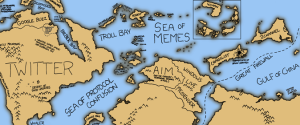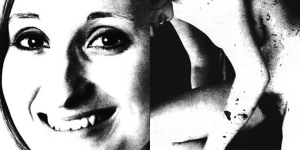Recently, I’ve read a lot about the role of the online world in the lives of writers. At the Writer’s Digest Annual Forum 2015, FutureBook were there on stage talking about writing and the community, assessing the impact community has had upon the way we write and the way we publish literature.
“Once,” they commented, “writing was the most solitary of professions; now it’s the most social.”
And that made me think. Who would I be today if not for the initial spark of encouragement to write? Who would I be without my community, my writing buddies like Nerd Cactus, or more recently my boxing partner who spars with ideas as much as her fists?
Until I was about eight, I wanted to be an astronaut.
I was born the year the walls came down and the webs went up. It was the last year of the Cold War. The first year of the Internet Age.
My dad had a mobile phone that looked like a defibrillator and our little family of three lived in a many-storied townhouse in Wandsworth. It was at least a decade before it became fashionable to live there. At one end of our road was a school for badly behaved boys and at the other an ageing hooker worked the corner, flashing sagging lingerie and raw gums to anyone who stared.
A few years later and the family had grown – the twins had arrived and the dog was given away. My brother and I pushed my sister down some stairs (I don’t think it was deliberate). We moved out of London to an old farm with far fewer staircases. Out there, in the countryside, you could see stars. I don’t think I’d ever seen them properly, living in the city, and I remember spending hours with my dad staring upwards with him pointing out Ursa Major, Ursa Minor, Orion’s Belt and Sword, Cassiopeia, Gemini, Draco.
At the time, no one realised how crap I was going to be at maths and physics – or that I’d turn out to be terrified of flying – but there it was: whilst everyone else wanted to look after fluffy animals or was fussing over their Barbie’s latest car, I was organising Beanie Babies into rocket ships and sending them off to Mercury. I’d imagine them running around trying to find the cold side of the planet the same way you chase the cold side of a pillow.
Even as pre-teens we knew the basics of computers – how to cut, paste, copy, undo, and how to take part in online games. The sound of dial-up modem added a beep-beep-boop-whirligig tone to our childhood.
Then I had The Teacher. A title that here refers to one of those fizzbubbling educators that make you enquire within about everything. She set an assignment: use alliteration, similes and metaphors in a one-page ‘fill in the blanks’ exercise. Me being the precocious and loquacious brat that I still am, handed back a three page story ‘TBC’.
She replied with a bumblebee sticker and offhand reassurance: you should write a book.
So I did.
I started straight away. Finished it when I was thirteen. It was god-awful. Every chapter introduced a new character or someone got kidnaped. I invented mythical beasts called Raziguls that looked like a kraken drawn by a clay-brained, knotty-pated fool (aged 13 I liked to think I was good at art but I have about as much talent for it as Katie Hopkins does tact).
My parents were kind. They were nice about my new hobby. They indulged me as I turned up the volume on Dark Side of the Moon and spent hours scribbling.
They also let me use the Internet. From 6pm onwards, when dial-up was cheaper, I was allowed to go online and browse. I quickly became part of my first online writing community: Stories.com (now Writing.com).
Writing was like the lights turning on. I started typing tales with other people, posting and sharing my work, giving and receiving feedback.
Dreams of going to the moon simmered away as I realised, with words, I could go to any planet I wanted and take other people with me. And all those constellation, they had stories to tell. Writing became essential. To feel the body electric.
Stories are the first and most primal virtual reality. They are inherently social - blurring and blending the boundaries of self and other. We might construct them as individuals but they are shared spaces, interactive spaces between reader, author and text.
Think of it this way: through fiction, life becomes like a house riddled with a thousand secret passageways to other houses, other dreamscapes and landscapes and worlds. Through the Internet, those metaphorical spaces become even more extensive and multi-dimensional. They invite you not just to walk through other people’s houses but to help build them.
Moreover, as the Internet has grown, as computerized, multilinked writings that are as integrated as any social network have extended, the nature of the literary has only expanded to become more inclusive, more allusive, more virtual. And this, from where I’m typing, is closer to the social mind than ever.
Flash forward a few years.
It was around university when I started to become disillusioned with larger communities online. There was so much pressure to be involved with everyone else that I'd forgotten about my own work and ideas. And whilst I appreciated the odd pats on the back from strangers, I relished the feedback that was brutal, honest, insightful. I hated the platitudes people offered: ‘Buddy, I’m so sorry your story got rejected – I’d give it 1000% out of ten, ignore the haters.’ There was so much of the Simply Positive attitude when what I needed was someone who’d help me kill my darlings. Even if they just whispered over my shoulder whilst I pulled the trigger.
From where I was sitting, editing had fallen into a rut. Editors are supposed to edit: well, of course. What else should they do? But the turning wheel of the publishing industry made it seem that publishers no longer read like writers. They read like accountants. Where were the Claire Walshes or the James Woods or the Gertrude Steins? Where were the editors – not the publishers – who’d tear a book a part and then give the writer a needle, thread and an outline by which to stitch it back together again?
So I took a step back. Not a big one, but enough that I was able to focus more on my own writing and on offering to others the kind of feedback I thought was valuable. I started reading like a writer. Editing. It was 2011. Jonathan Franzen had just had some trouble with his book, Freedom, which to his utter dismay was launched in bookshops riddled with errors he’d thought edited out weeks previously.
Today’s social landscape is shaped by the pervasive influence of digital technology. It’s created a paradigm shift in the way that we live, interact, think of others and ourselves. It’s transformed writing and publishing. It has the potential to do great things for literature. And is doing them, in some places.
The digital has not destroyed writing, or relegated editing to the cemetery of forgotten talents. It’s just taken a little while for the literary business to balance out again with literary art. Dig below the surface, innovators exist. Dig deeper, communities can be helpful (see Writer Unboxed), provide support and genuine feedback.
I’ll never regret being part of online culture or writing circles.
Writing is solitary. To have a group that understands your problems and will have those peculiar conversations about writing can be stimulating and may even help when it comes to marketing and selling your work. Through it I’ve met people I admire, people I adore, people I'd play my part for if it'll help them succeed. They're adventurers too. And I suspect a fair few of them wanted to be astronauts back in the day.
So whilst I resent Team Follow Back, I also respect it. And whilst I roll my eyes at automated content, I understand why there’s a need. And whilst I’d rather be on the periphery of a writing community, I will always make the effort to take part.
Fact is, I’m an inevitable creation of the Internet. A digital native. Comfortable online and offline. Aware that IRL is as imaginary as Hogwarts.
And if you’re reading this, most likely, so are you.
Je serai poète et toi poésie,
SCRIBBLER



No comments:
Post a Comment
Scribble Back